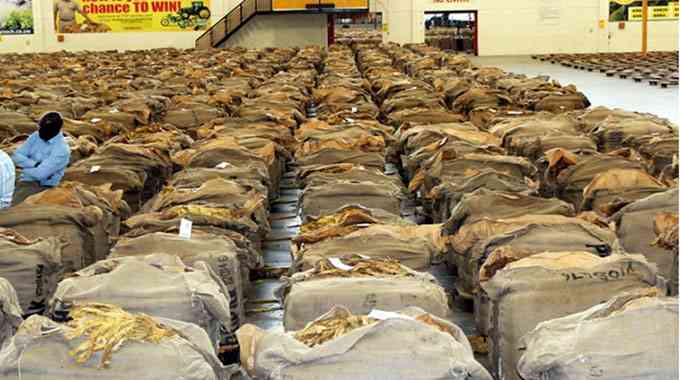
AFTER taking TA Holdings in 1997, there was little hope Shingai Mutasa (SM) would steer the ship in the right direction and many investors viewed his strategy as “going by the wind” And wherever the wind drifted the then conglomerate they were not willing to follow. The now investment company is having the last laugh. Mutasa this week spoke to businessdigest’s Paul Nyakazeya (PN) about the company, indiginisation, the Joina City and what motivates him.
(Nyakazeya) TA Holdings’ model is on investing. What do you look for in a company and do you have any specific sectors that you target? (Mutasa) I think it is very important that we communicate effectively that we are an investment company. I read in the newspapers that we are a conglomerate, but we are an investment company; our role is to look at opportunities, invest capital, and to be proactive in the investments we enter, so we either become a controlling shareholder, or a highly influential shareholder.
But we operate as an investment company in that we do not then take control of the cash flows, although Bothwell (Nyajeka) is chief finance officer of TA, you find that Anthony Makonese, who is the financial director for Zimnat Lion, has complete responsibility for the Zimnat Lion cheque book, it’s not Bothwell. This is one major difference between conglomerates and investment companies. A conglomerate is what TA was when we took over – literally all the cheque books came in Bothwell’s office. So that he was able to direct which account was paid and where money was allocated.
We do not do that; we leave our investee companies alone to run their own businesses. We put a lot of our energy to ensure the investee company operates optimally, through significant participation on the boards as well as looking to appoint the CEO where we can. The issue of cash flow management makes a big difference for us in differentiating between an investment company and a conglomerate. If we can achieve the clarity of differentiating us as an investment company this year, I would be very happy. (Nyakazeya) Right now you are active in insurance, hotels and agro-chemicals and recently building materials distribution, what is the attraction in theses sectors compared to other sectors at present?
(Mutasa) I think for me as an investor, I say to myself if it were my money, ‘how would I like my money to be invested?’ Looking at each sector we are in as a portfolio investment I have the following comments. Tourism and travel, the long term opportunities for business travel and tourism in Africa are very significant. I know there are not enough hotel beds on the continent. So the evolution of a strong hotel brand to capture the growth of hotel rooms is not only exciting; it can be very financially rewarding. Financial services is a very broad sector. We stumbled upon the insurance sector. We became knowledgeable of the insurance sector, whether its reinsurance, short term or life, so we understand that sector very well. The growth projectile of insurance within the continent is very significant and we would like to use our expertise to participate fully in the continental insurance space. Locally it is even more significant. A statistic that exemplifies this opportunity within Zimbabwe is the premiums for insurance. In 1998/1999 insurance premiums in Zimbabwe were around US$600million. Last year those premiums were about $60 million; that is how that sector has shrunk. I therefore see an amazing opportunity for it to grow back and beyond. The insurance sector is a great sector. Our philosophy is to focus on underwriting profitably which I believe protects the insurer in the long term, as opposed to what some other insurers do, which is to cash flow underwrite, something that was very prevalent during hyper inflation days.
We want to be very responsible underwriters. So it’s a sector we like very much. When you look at the growth of insurance on the continent of Africa; Nigeria for example has just began to implement pension fund legislation. Zimbabwe has had it for a while, there is a potential for us use our expertise to participate in these markets. We are in Sable Chemicals, what we like about Sable is that it is so strategic to the future of the Zimbabwean and regional agricultural economies. We have been sending some of our key guys to other countries and we have come to realize that fertiliser in most countries is a very political business. It is also very clear that a commitment not only from the producers but from government to making sure that the supply of fertiliser to the society, especially like ours is paramount. When you look at the usage of fertilizer globally, in the western developed economies, you are looking at a hectare usage of about a 100kgs of fertilisers, whereas in our environment it’s between 5 and 8kgs. It gives you a sense of what we need to do if we are going to be producing adequate foodstuff not only for our society but the region. So Sable’s position is very simple. It is the only one of our business that does not have easy scaleability around the continent; it’s much more specific to the sub-region. But we think it is a very exciting sub-sector. So those are the current sectors that we are in. (Nyakazeya) What about PG? (Mutasa) Yes PG, I think I would like to look at it as a very significant growth opportunity for us. Our country has been affected by challenges over the past 12 years. There has virtually not been any significant construction except for the Joina City which took 12 years to build. Just to rebuild schools, rehabilitating offices, homes, the roads that need attention – it’s a very significant area that will be targeted by everybody; government, NGOs, even ourselves. The space that PG occupies is very critical and is ideally situated to be a significant player in that space. (Nyakazeya) Are you happy with what has been happening at TA Holdings since you joined the investment company in November 1997? Given a choice would you have made your money elsewhere? (Mutasa) As an investor I came into TA when its share price was an average price of 2,50 cents per share. At the moment it is struggling at between 30 and 40 cents. But I believe that TA (share price) should be in the 0,90c to US$1 space currently. That kind of growth over 12 years from an investor’s point of view, of between a 30 to 40% annual return on my capital, is excellent. If I can do that continuously for the rest of my life I would be very happy.
However, it could have grown so much more had not the past 12 years been so painful. One of the things we experienced during the hyper-inflationary environment was a general destruction of wealth. At TA we were able to preserve this and it gives us a very significant advantage as we move forward.
- Chamisa under fire over US$120K donation
- Mavhunga puts DeMbare into Chibuku quarterfinals
- Pension funds bet on Cabora Bassa oilfields
- Councils defy govt fire tender directive
Keep Reading
Are there things that I would have done differently? For me it is about people. Probably I would have acted quicker in appointing the right people and firing the wrong ones. In terms of the sectors we are in I think we are in the right direction. (Nyakazeya) How much money have been put in Sable Chemicals now going forward and what role do you see it playing in TA’s overall strategy? (Mutasa) If you look at Sable it went down to 50 000 tonnes last year, our target is to reach 120 000 tonnes of production this year, which is almost a one-and-a-half times’ growth in one year. To achieve that we do not anticipate, as shareholders, the need to inject fresh capital. Since the beginning of the year we have moved from four electrolytors to eight and by mid year we should be at 10. A lot of that will be through internal cash flow management as well bank capital that the company has capacity to borrow. To move the other four we need some capital. The real story for me is the building of new capacity beyond the 250,000 tonnes we have. (Nyajeka adds) We are looking at US$45 million over the four years. We are looking at US$10 million every year. Most of this will be internally generated by the company. (Nyakazeya) When you invest in a company do you have an exit strategy in the event that your objectives do not go according to plans?
(Mutasa) My assumption is when we enter into a company things are going to do well. I cannot enter into a business with the view that things might go bad. But it happens in life. But my investment style when I enter business is I am not doing it for a fixed period of time. If I can be in Sable and it is producing excellent results and management is growing the business I do not see any reason why I should exit. I like being in for the long term. My inclination is not going into a business to get out, but to grow the business, and if we like the business and believe in its long term future, we try and buy more of it. (Nyakazeya) Your latest financial results show that you made a loss, but your cash flows are rising. What are your short term plans with the cash? (Mutasa) I think there is a lot of re-capitalisation that needs to take place within our investments. For me this is when I truly begin to get excited. At a time when companies are going to the market to raise capital, our balance sheet is very strong and we can re-capitalise most, if not all of our needs internally, without burdening the shareholder. This will be not only for the insurance group but also for the hotels. Even with Sable, the model does not require us to go back to the TA shareholders for capital. I think it is a great story for TA. It speaks volumes about our investments and the management teams that have driven the group.
(Nyakazeya) What are your thoughts on indigenization? (Mutasa) I do not know any country that is sustainable without an empowered people. The challenge is to achieve this in a manner that is not only sustainable but competitive. Further, we must be clear what we mean by indigenising our country. I believe a strong country is one where all members of the society have a great chance to fulfill their dreams and aspirations. I want our country to be the natural choice of those brilliant people globally who want to achieve more and are not able to within their own environment. To achieve this we have to be a very attractive destination. This is seen through, how well educated our people are, how healthy they are, the quality of their lives, the beauty of the environment they live in, and the growth potential that is being realized by the country.
Not everyone is an entrepreneur and therefore to focus on ownership alone is very narrow. The key is how we get the resources of our country to directly contribute to the creation of a first world economy within Zimbabwe. How do we create an environment to attract capital which will be critical to the development of the environment I mentioned earlier! As I have mentioned before, as an investor in other countries, we do not attempt to go alone. We will always find local partners, it is good business sense. What we need to do is make our country become more competitive, that’s the question we should be focusing on. But you also look at sectors which if you do not have growing local participation, I think the long term alignment can be lost. It is that alignment that we must seek to achieve, competitively.
When I look at the banking sector in the 90s, there was no greater act of empowerment than the introduction of the locally managed and controlled banks. For me taking management control of TA in the late 90s was through the support of bankers like Nick Vingirayi, Intermarket Merchant Bank, (Unibank) CEO Clifford Mushambadzi. They took a risk on me, it was easier for them to take a risk on me because they knew who I was, what I could do and trusted me. At that time it would have been very difficult for someone sitting in New York, London or Johannesburg to make a genuine decision on me. But that was done without taking equity or forcing Stanbic, Stanchart or Barclays to indigenise. Even today, the future of our banking sector will be on the growth of those locally driven institutions. They clearly showed that they could compete with the international institutions. Somewhere the international banks would wake up to the need to find local partners.
These guys were empowered. I think there are many ways that we can achieve this with a view of creating sustainable and significant growth. I think the models we saw in the 90s in the banking sector achieved amazing results. (Nyakazeya) Do you see a possibility of TA Holdings assisting other companies to fulfill the indigenization regulations by investing in them? (Mutasa) I think TA has been over the years one of the most empowering organization in this country when you consider the number of companies TA sold between 1992 and 2004, predominately to black entrepreneurs. It played a very significant empowerment role. TA as an investment partner? We believe that many global companies as well as local companies look at us as a good partner. We have our own capital, our governance is very good, our local knowledge, both in Zimbabwe and Africa is excellent, we are long term in our commitments and we strongly believe in the future of our markets. We understand our role and the frame of the partnership and therefore I think we make a good partner. But this is aside of satisfying a role or legal requirement. It makes good business for somebody, for example Aon, to seek us as their partner. It was not because of the law but they wanted a good local partner. (Nyakazeya) How do you feel now that Joina City has finally opened? (Mutasa) Relieved (Nyakazeya) What where your initial plans for the City and how have they altered over the years?
(Mutasa) On Joina City we wanted to show that buildings can be built by us (Zimbabweans). That philosophy has not altered at all. It is instructional that in building the Joina City although it is ascribed to us, we used resources from all over the world to make it happen, that is the way it should be. (Nyakazeya) How much did you invest in Joina City? (Mutasa) I have put in 16 year of my life. (Nyakazeya) In monetary terms (Mutasa) It is difficult to put a figure now. What has made me happy has been the commitment of the local pension funds; CAIPF, LAPF, NRZPF and ZIMNAT LIFE. The Joina City would not have been possible without their total commitment to this journey. Ultimately this building belongs to the many Zimbabweans who have invested their life savings in it. The pension funds have been amazing; they stuck through thick and thin. Economically there has been a sound investment, if you probably look at any of the investors, the component of the Joina City in their portfolio is very important; it requires people to take a very long view of the country. (Nyakazeya) What type of clients are you targeting for the building and what has been the response like? (Mutasa) We are completely over subscribed. We have awaiting list of three times the space that we have at the Joina City. What we are trying to do though is to balance in terms of entertainment and retail. We just feel that there is enough of us, both locally and regionally, to support a retail experience such as Joina City. We might see places like the Ximex Mall being knocked down and re-built to accommodate retail capacity and strengthen our city as a prime shopping location. For me Harare is a great city which does not need a lot to bring it back to excellence. We need to build a city nucleus we as Zimbabweans would be proud of. (Nyakazeya) Who is Shingai Mutasa and what motivates you? (Mutasa) I am an African, I am a passionate Zimbabwean who is very optimistic about our future as a continent and a nation. I believe in God. I used to play a lot of squash, but not anymore. My children and wife occupy a very important space in my life. What motivates me is to be part of a generation that is going to make Zimbabwe a first world economy. I envisage that this will be a thirty year journey, but very achievable. (Nyakazeya) Who are the people who have inspired you in your life? (Mutasa) My father, who is now late, was the major mentor in my life. His words and guidance shaped me to what I am now and continue to guide me. My family played a very important role as well. If we come to people outside the family it has to be men like Abraham, Jesus Christ, Mohammed, Lee Kwan Yeuw, Warren Buffett, Mahatir, the founding fathers of America, our founding fathers of Zimbabwe. They were very influential, people who come in for a very short space of time and make such a profound difference to the future generations.
I must think more about that question though. (Nyakazeya) The perception on the market is that Shingai Mutasa is very conservative, is that a correct assessment?
(Mutasa) No. It is a wrong assessment. You do not build a Joina City if you are conservative. You have to be a very optimistic human being, even a little crazy, to build and continue to build in the environment we have just witnessed. TA is prudent, not conservative. When hyperinflation took over we could have been reckless with shareholder capital. Under such an environment most people got hurt. We took a position that preserved the capital. I do not think that’s being conservative but being smart and optimistic. We invested in countries from Ghana, Nigeria, Namibia and Botswana. People who are conservative do not go outside their neighbourhood.











